 Petzlover
Petzlover Both Bully Kutta and Indian Spitz are originated from India. Bully Kutta may grow 64 cm / 26 inches higher than Indian Spitz. Bully Kutta may weigh 83 kg / 183 pounds more than Indian Spitz. Both Bully Kutta and Indian Spitz has almost same life span. Bully Kutta may have more litter size than Indian Spitz. Bully Kutta requires Low Maintenance. But Indian Spitz requires Moderate Maintenance
Both Bully Kutta and Indian Spitz are originated from India. Bully Kutta may grow 64 cm / 26 inches higher than Indian Spitz. Bully Kutta may weigh 83 kg / 183 pounds more than Indian Spitz. Both Bully Kutta and Indian Spitz has almost same life span. Bully Kutta may have more litter size than Indian Spitz. Bully Kutta requires Low Maintenance. But Indian Spitz requires Moderate Maintenance
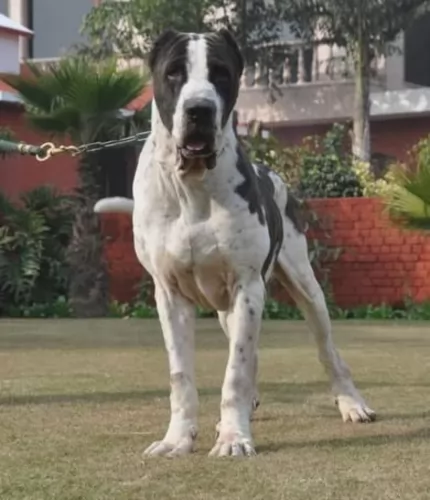 This well built, powerful dog breed is also known as Indian Alangu Mastiff or Pakistani Mastiff. These dogs come from the Punjab and Sindh region of the Indian subcontinent. It is believed that mastiff dogs came with British soldiers during the British invasion, however English Mastiffs, Bulldogs, Bull Terriers and Great Danes are seen as potential ancestors of this large dog.
This well built, powerful dog breed is also known as Indian Alangu Mastiff or Pakistani Mastiff. These dogs come from the Punjab and Sindh region of the Indian subcontinent. It is believed that mastiff dogs came with British soldiers during the British invasion, however English Mastiffs, Bulldogs, Bull Terriers and Great Danes are seen as potential ancestors of this large dog.
There are disputes about the country of origin of this breed, and some people claim that the dog comes from India, while others say it comes from Pakistan. Certainly in Pakistan these dogs are still used for fighting.
 The Indian Spitz is a working dog and has always been used for hunting and tracking small game. It is a popular dog breed in India.
The Indian Spitz is a working dog and has always been used for hunting and tracking small game. It is a popular dog breed in India.
There isn't too much information on the exact origin of the dog but dog experts tell us the dogs have descended from different Spitz breeds and wild wolves, and that they date back thousands of years.
People often mix them up with the Pomeranian, but they're different, being introduced in India by the British. The British began breeding them from a stock of German Spitz's and years of breeding produced the ideal dog type which could cope with the tempestuous weather conditions in India.
They aren't recognized by any major kennel clubs but the Kennel Club of India is working to establish the Indian Spitz as a separate breed.
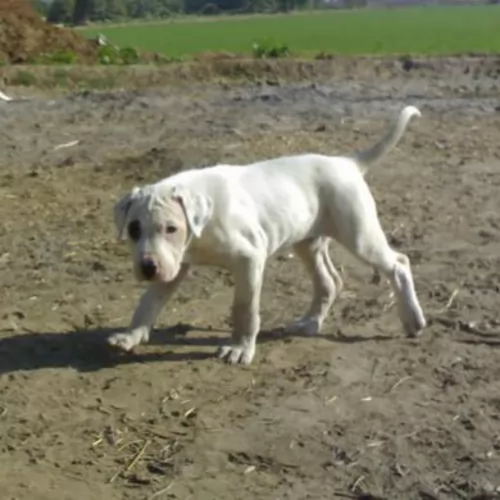 The Bully Kutta is a big, heavy, muscular dog, standing at roughly 81 – 89cm and weighing in at 70–90kg. He isn’t particularly good with children or with other pets simply because the dog is aggressive by nature. If you do opt for this large breed, you’re going to need a large garden and he is going to require a lot of exercise.
The Bully Kutta is a big, heavy, muscular dog, standing at roughly 81 – 89cm and weighing in at 70–90kg. He isn’t particularly good with children or with other pets simply because the dog is aggressive by nature. If you do opt for this large breed, you’re going to need a large garden and he is going to require a lot of exercise.
This is a dog breed that is going to require socialization and training if you want him to be obedient and calm, as he is inclined to be a dominating breed. He’s an intelligent dog and when well trained, he makes a splendid pet with firm, fair owners.
The Bully Kutta has a large, broad head which is supported by a thick well-muscled neck. The skin around his lower jaw is loose. The ears are short, set high and are mostly cropped, but other times they are left to flop over. The tail is sometimes docked but these days mostly left long and tapered.
He has a short smooth coat and is essentially white in color although the coat can also be fawn, brown, black or brindle.
 The Indian Spitz is an attractive, fluffy looking dog breed thought to have been domesticated thousands of years ago.
The Indian Spitz is an attractive, fluffy looking dog breed thought to have been domesticated thousands of years ago.
The dog comes in two sizes – the smaller- and larger size. The Smaller Indian Spitz stands at between 20 - 25 cm and weighs between 5 – 7kg while the Greater Indian Spitz stands at 35-45cm and weighs between 12 – 20kg.
The dog has a long-haired coat, with the hair on the head being shorter than the rest of the body. The color of the coat can be white, brown or black and white.
The Indian Spitz is an easy-going dog which adapts to all kinds of living conditions in India. They therefore adapt easily to life in the city or in the countryside.
The Indian Spitz is a social, friendly dog who is loyal towards his human family, showing his joy at being with them with high-pitched barking. He gets on well with children in the home and because he isn't aggressive, he gets on well with pets in the home too.
He is intelligent which means that he is able to be trained and socialized, turning him into an obedient pet who takes his job as guardian and protector seriously.
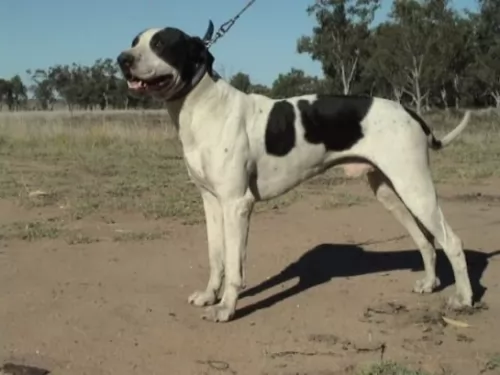 The Bully Kutta is a powerful, imposing dog and they have been nicknamed the ‘Beast from the East’. Unfortunately it is this dog’s thick bones, his looks and his strength that have him used for cruel dog fighting in Pakistan.
The Bully Kutta is a powerful, imposing dog and they have been nicknamed the ‘Beast from the East’. Unfortunately it is this dog’s thick bones, his looks and his strength that have him used for cruel dog fighting in Pakistan.
When not used for fighting, he makes a loyal, devoted companion for the owner who ensures proper socialization and training. Well raised Bully Kuttas are then good with children, being loving, protective and playful.
One just hopes that the future of this giant dog breed is brighter, and that he will be looked upon as more of a companion that just a dog-fighting object to bring in money for his owner.
 Playful, feisty, intelligent, loving and loyal, the Indian Spitz is full of character and just loves being in a loving family home.
Playful, feisty, intelligent, loving and loyal, the Indian Spitz is full of character and just loves being in a loving family home.
Easy to train, he becomes a wonderfully obedient canine friend who loves nothing more than to spend time with you, especially when it is outdoors going for a walk or playing ball.
He is an entertaining little dog too, and anyone wishing to buy a dog like this won't regret it as he brings in a joyful dimension to any home.
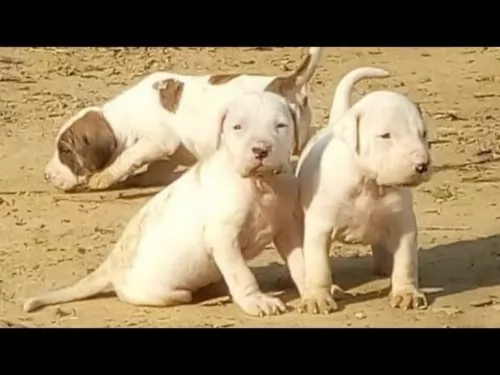 Your Bully Kutta is generally a healthy dog and not often affected by hereditary diseases, but with giant breeds such as this you will have to look out for diseases common to large dogs.
Your Bully Kutta is generally a healthy dog and not often affected by hereditary diseases, but with giant breeds such as this you will have to look out for diseases common to large dogs.
Typical illnesses to watch out for will include hip dysplasia, arthritis, skin allergies and bloat.
This is an inherited condition where the hip joint is improperly formed. For your Bully Kutta it causes wear and tear as well as stiffness in the hips and your dog battles to rise after lying down.
Arthritis in your dog can be managed but it can cause a lot of discomfort for him. This inflammation of the joints can cause pain and stiffness. It is more often seen in older dogs. It can also start at an early age because of problems with bone and joint development and abnormal rubbing within the joint.
Today there are a number of therapy options that can bring some kind of relief to your dog.
 These feisty little dogs can reach 14 years of age if looked after well.
These feisty little dogs can reach 14 years of age if looked after well.
Your Indian Spitz will need to see a vet when he is 6 weeks of age for his first vaccinations and also whenever he is sick.
He is a dog breed that doesn't get sick very easily, but still it is wise to know about some of the more common dog diseases that could plague your little pet, and these are among others, hip dysplasia, epilepsy, cancer and vision- and dental problems.
It is important to be keeping an eye on your dog's oral health. Infected teeth can have a bad impact on his health and can actually contribute to heart- and kidney disease for instance.
One of the major causes of dental disease in dogs is none other than diet. Always try to feed your pet the best quality food there is. Certainly if you feel your pet isn't getting the best food, try a probiotic supplement as this can create a healthy bacterial environment in your dog’s mouth.
Check your pet's mouth regularly so you can attend to any dental problem before it gets out of hand.
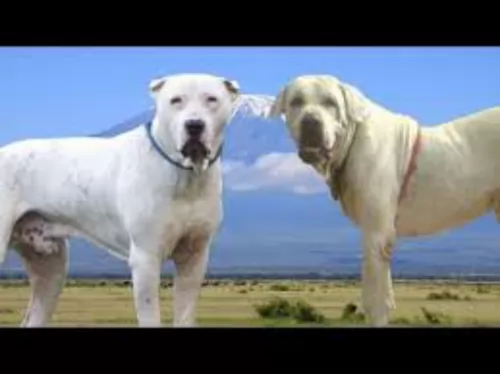 The short coat is low maintenance and as a moderate shedder too, all that is required really is to give your Bully Kutta a good brush twice a week to keep the coat in good condition.
The short coat is low maintenance and as a moderate shedder too, all that is required really is to give your Bully Kutta a good brush twice a week to keep the coat in good condition.
Brush his teeth 2 or 3 times a week with special canine-toothpaste and toothbrush to prevent plaque build-up. He’s a drooler too, so you will need to wipe his face and maybe your clothes of slobber from time to time.
This strong, muscular dog of yours will require an excellent diet. It’s always wonderful if you can give him home-made food such as vegetables, rice and meat. These days you get excellent commercially manufactured food for dogs, and your vet can advise you on the best food for a large, active dog such as the Buly Kutta.
Raw meat is absolutely essential for your dog from time to time and will ensure that his coat doesn’t become dull and with bald spots. Remember, that before dogs were domesticated they used to live on raw meat, so see that he gets some raw meat to prevent skin disorders. Make sure your large pet has a constant supply of fresh, cool water.
Bully Kuttas are going to need a walk every day in the form of exercise. If he is socialized you can take him into the park for ball games. He is a dog that will require plenty of space.
 These dogs have been used to a diet of milk and rice, but if possible it can be beneficial to the dog to include some cooked chicken and vegetables too. Raw meat is also important, but it is expensive, so just adding it in from time to time can still be beneficial. Water which is cool and clean should be available to the dog day and night, non-stop.
These dogs have been used to a diet of milk and rice, but if possible it can be beneficial to the dog to include some cooked chicken and vegetables too. Raw meat is also important, but it is expensive, so just adding it in from time to time can still be beneficial. Water which is cool and clean should be available to the dog day and night, non-stop.
Your Spitz dog will simply require a brush twice a week to keep it clean and vibrant and free from loose hairs. While brushing him, make a point of checking him for fleas and ticks as well.
This is a busy little dog that wants to involved in everything you're busy with. He will love to join you in your long walks each day or if you take him to the park, he will love the chance to run off his leash.